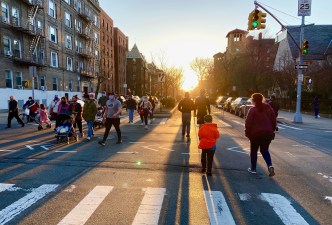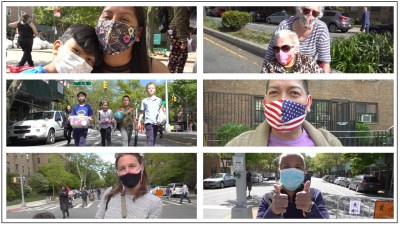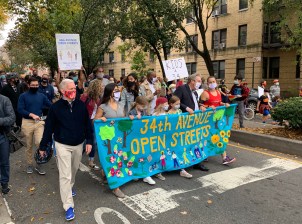Opinion: Creating Space in America’s Densest City

In advance of Saturday’s rally to turn 34th Avenue into permanent car-free space for park-starved Jackson Heights and Corona, Streetsblog is publishing this opinion piece jointly written by one of the key organizers of the 34th Avenue open street and an urban planner currently working for Ford’s Spin unit.

Many neighborhoods across New York City suffer from a lack of open space and parks. But New Yorkers are resilient and creative. There are “open spaces” in front of every building across every borough. They may be paved with asphalt but the reimagination of the city’s streets can be the answer to the city’s need for more viable public spaces.
All across the city, we have seen how New Yorkers are ready to adopt alternative uses of city streets. NYC DOT rolled out Open Streets across the city last spring. The ones with community partners were an unmitigated success. Not only did they mobilize their residents in closing streets to vehicular traffic and opening them up for pedestrians, micromobility, but they also created children’s play spaces, instituted outdoor programming including Yoga, Pilates, Salsa, ESL classes and artist spaces.
Since mid-September, Spin and Streetlab have worked with those same community partners to build on their success. Street Lab & Spin have kicked it up a notch with their innovative programming including PLAY NYC, drawing workshops etc. and more importantly resources that empowered these same communities to strengthen their own programming.
Hundreds of residents have participated in Spin and Street Lab programs on 34th Avenue from 93rd to 94th streets in Queens. Programs include hands-free safe play activity for children, art labs and homework hubs for children to safely interact. The program has been so successful that there’s a push from residents to make the installation permanent.
Since COVID-19, automobile traffic has dropped anywhere from 20 percent to 50 percent, depending on the borough. We have excess capacity on city streets and should use this time to re-invent these spaces.
Right now, our greatest challenges can also provide our greatest opportunities. The dramatically reduced congestion on city streets provides us with the chance to create new uses for even a small percentage of the 6,000+ miles of paved road in New York.

Across other areas of the city, we have seen the opening of streets for increased pedestrian traffic and other non-automobile transportation as well as the expansion of “sidewalks” to enable outdoor eating and retail. A study of sidewalks throughout New York City reveals that our sidewalks are among the most narrow, making them less safe for social distancing purposes.
Micromobility options have exploded on Open Streets – people are walking, biking, rollerblading using skateboards, and scooters in record numbers. According to Fast Company using data from Strava bicycle traffic has seen explosive growth across the city with an astounding 1,220 percent increase on the 34th Avenue Open Street. Give people a safe space for micromobility and they will use it to get to school, to work and to play. They just have to feel safe.
There will be a time when we live in a non-COVID world— but that doesn’t mean we have to return to everything from the past. We can make our spaces better, more equitable and safer. Open spaces should be available in every neighborhood and not just those who have the means to live near a major park like Central Park or Prospect Park. For more than a century, New York’s streets have been dominated by automobiles and have become more and more crowded, dangerous and inefficient as every year has passed.
Let’s use this once-in-a-century societal shift to break the cycle of congestion and find new and better ways to make New York’s streets safer and both more, efficient, and equitable for the next 100 years.
Jim Burke is a founding member of 34th Avenue Open Streets Coalition, a board member of Ciclistas Latino Americanos of NY, and Chair of Queens Transportation Alternatives and the Queens Volunteer Committee. Kay Cheng is leading Spin’s Policy Initiatives Team. She is a trained Urban Planner and Designer and is a former employee of the New York City Planning Transportation Planning Division.





